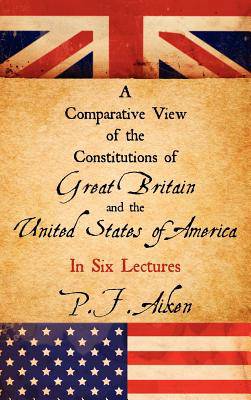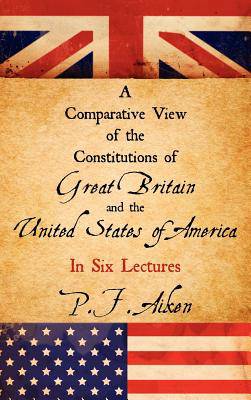
Bedankt voor het vertrouwen het afgelopen jaar! Om jou te bedanken bieden we GRATIS verzending (in België) aan op alles gedurende de hele maand januari.
- Afhalen na 1 uur in een winkel met voorraad
- In januari gratis thuislevering in België
- Ruim aanbod met 7 miljoen producten
Bedankt voor het vertrouwen het afgelopen jaar! Om jou te bedanken bieden we GRATIS verzending (in België) aan op alles gedurende de hele maand januari.
- Afhalen na 1 uur in een winkel met voorraad
- In januari gratis thuislevering in België
- Ruim aanbod met 7 miljoen producten
Zoeken
A Comparative View of the Constitutions of Great Britain and the United States of America
P F Aiken
Hardcover | Engels
€ 25,45
+ 50 punten
Uitvoering
Omschrijving
In six lectures, Aiken compares the constitutions of Great Britain and the United States and also examines their similarities and differences in terms of government, (The House of Commons and the House of Representatives, the Senate and the House of Lords), religion, slavery, elections, the judiciary and other topics. "The author's design was to compare our limited monarchy with the greatest modern republic, not in order to disparage either, but to elucidate both to a popular audience of his countrymen (...) The subject has an intrinsic claim to attention. It embraces a variety of topics, both entertaining and important, and historical truths of immense practical value, concerning which the people are deeply interested and too often misled." --(Preface, viii Contents: Lecture One: Introductory Lecture Two: Provincial Institutions. Outline of American Constitution. Lecture Three: Elective Franchise. Legislative Assemblies. Lecture Four: The Executive Power. Lecture Five: Law-Religion. Lecture Six: Social Influence of Political Institutions. Peter Freeland Aiken (1799?-1877) was a Scottish advocate for some time, and later moved to Bristol, England. He was the author of The People's Charter, and Old England For Ever (1839) and War: Religiously, Morally and Historically Considered (1850).
Specificaties
Betrokkenen
- Auteur(s):
- Uitgeverij:
Inhoud
- Aantal bladzijden:
- 202
- Taal:
- Engels
Eigenschappen
- Productcode (EAN):
- 9781584779476
- Verschijningsdatum:
- 23/05/2011
- Uitvoering:
- Hardcover
- Formaat:
- Genaaid
- Afmetingen:
- 152 mm x 229 mm
- Gewicht:
- 467 g

Alleen bij Standaard Boekhandel
+ 50 punten op je klantenkaart van Standaard Boekhandel
Beoordelingen
We publiceren alleen reviews die voldoen aan de voorwaarden voor reviews. Bekijk onze voorwaarden voor reviews.









